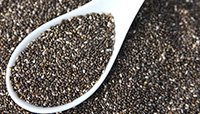The so-called paleolithic diet has become mainstream enough in recent years that it can be hard to know where it begins, and where its assorted variations and individual customizations end. Nevertheless, by now you probably think you "know" it on some level, even if you wouldn't dream of following it.
Maybe you've heard that it has plenty of high-profile adherents in athletics, ranging from countless CrossFit enthusiasts to renowned strength coaches like Charles Poliquin, who has said that every one of his successful Olympic athletes eats in this manner. Or perhaps you've heard miraculous-sounding transformation stories about how paleo transformed someone's body or helped cure conditions ranging from diabetes to lupus. In either case, paleo advocates can be both powerful and persuasive in their claims.
So how should you undertake the project of separating the solid advice from prehistoric hokum? Even if you aren't going for the gold, should you give up the grains? Sure, you can learn plenty about regressive diets from a host of websites and forums, but don't forget that all of these sources are in dialog with specific authors, whether they acknowledge (or even realize) it or not. No matter where you end up, having a firm footing in the classics is never a bad idea.
In the second edition of Strong Words, Bodybuilding.com's book review feature, we introduce you to six paleo titles you should get to know. Read them before you take the leap, to remind yourself of why you do what you do, or just to keep your chops sharp against critics.
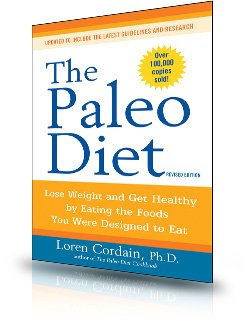
The Paleo Diet: Lose Weight and Get Healthy by Eating the foods You Were Designed to Eat
by Loren CordainPublisher: John Wiley & Sons
Price: $14.95
Who it's for: Paleo noobs looking for a simple, principled starting point, or longtime followers who wonder if they've strayed too far.
Loren Cordain's "The Paleo Diet" is the one that started it all. And for that reason, you may think that means you could repeat it—or maybe refute it—without having to pick it up. But if you only know paleo as filtered through your friends, workout partners, and nutrition blogs, Cordain's original work may have a few surprises for you.
The first revelation, about which Cordain is quite insistent throughout the book, is that this is not a low-carb diet, at least not in principle, anyway. He rails against what he calls "low-carb fad diets" throughout "The Paleo Diet," insisting that his system allows unlimited consumption of fruits and vegetables. Indeed, he demands high levels of both to balance out the meat-heavy content of the diet. The dietary system he outlines isn't Atkins. It isn't keto. It's its own animal, and Cordain makes an effective argument that in its purest form, it is both safe and healthy to follow.
Does this mean he is immune to criticism? Definitely not. Any system this principle-based will have some blind spots. First off, Cordain makes societal-level dismissals of things like salt and animal fats, often indicating that they are bad primarily because of the statistically rampant diseases associated with them. That may make them worth monitoring or limiting, but many individuals may find the case for moderation more compelling than for exclusion.
Likewise, the line Cordain maintains between Paleolithic humans and modern hunter-gatherer societies is, to say the least, convenient. Certain Eskimo tribes, for instance, are included because they support his basic "meat and vegetables" approach, while he ignores other ethnicities that have used grains, seeds, and starchy tubers in their diets for centuries. Due to the wide variety of environments in which humans live, the human diet is not, nor has it ever been, as simple or uniform as he presents.
Cordain's paleo oeuvre has expanded greatly since "The Paleo Diet" into other books and numerous other materials, so the original may seem a little stripped-down or simple to some savvy readers. But if you're looking for an approachable, affordable place to start, it's as worthy a candidate now as ever.
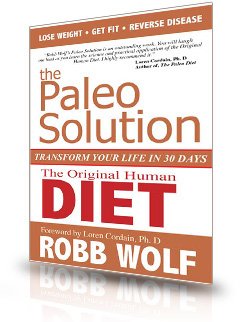
The Paleo Solution: The Original Human Diet
by Robb WolfPublisher: Victory Belt Publishing
Price: $24.95
Who it's for: Readers who never trust the first version of an idea, or who find Loren Cordain's version of paleo to be dry and impersonal.
In a few years, Robb Wolf has risen from being paleo's other author—like a younger, funnier Loren Cordain—to being the most prolific and engaging proponent of the popular dietary system. Cordain may have started the dialog with "The Paleo Diet," but Wolf is now where many go first to learn if it's right for them, and to have their questions answered. His long-lived Paleo Solution podcast, seminars, and ebooks have much to do with this, but his 2010 book "The Paleo Solution" remains his definitive contribution to the dialog.
Wolf's background as a research biochemist clearly informs the book; he is comfortable dissecting and utilizing wide-ranging studies to back his points. At least half of the book focuses on scientific discussion of nutrition rather than, say, recipes and anecdotal evidence. Despite that, "The Paleo Solution" is also quite personal in tone, because it was Wolf's solution long before it was his readers'. He suffered for years from debilitating ailments which left him "an emaciated 140 pounds" and wanting to die. He found his answer in a realization: "Grains and legumes, the most wholesome and righteous of foods, [appear] to be out to kill us."
Many readers will prefer Wolf to Cordain because of his written voice (a couple of sample chapters: "Grains and Leaky Gut: Or Keep Your Poop Where it Belongs;" "Sleep Ya Big Dummy!"). Some may find his tangent-packed style to be grating, or bristle against the way his casual voice overlays a formal and unyielding system. Because make no mistake, this is still Cordain-style strict paleo. That said, "The Paleo Solution" does offer some advantages over "The Paleo Diet." First and foremost, the recipes are more interesting (although both authors subsequently have released multiple recipe books), and there's a section on workouts and workout nutrition. (Wolf is a former champion powerlifter and kickboxer.)
If you're looking for a more flexible version of paleo, look elsewhere. Wolf wants you to give him a shot, and his version of "a shot" is 30 days of pure paleo eating. On the other hand, if you're raring to take the leap and are looking for a personable yet scientific guide to the strict lifestyle, Wolf is your man.
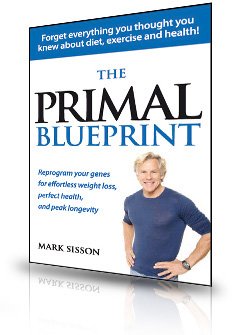
The Primal Blueprint: Reprogram Your Genes for Effortless Weight Loss, Vibrant Health, and Boundless Energy
by Mark SissonPublisher: Primal Nutrition
Price: $19.95
Who it's for: Eaters with primitive inklings, but who find the paleo diet needlessly restrictive in certain areas.
Since the mid-2000s, Mark Sisson has been the leading proponent of the other camp of caveman-style eating, known as "primal" or "Primal Blueprint." His blog, Mark's Daily Apple, has long been a top Internet resource for eaters of either persuasion looking to have their questions answered, stay abreast of nutritional research, or learn to make their lives more primitive through recipes and DIY guides. His website and its immense forum have enough information to keep you busy for months, but they're also big and unwieldy enough that it's probably worth the time to start your journey with his manifesto "The Primal Blueprint."
While he may not go by the name "paleo," Sisson definitely doesn't shy away from caveman imagery. He structures a fair amount of his narrative around comparing Grok, a hypothetical hunter-gatherer, with Korg (Grok spelled backward), a modern suburban desk jockey whose diet and inactivity encompass everything wrong with modern life. While it's correct to guess from that name game that Sisson basically views us as biological cavemen living in direct opposition to our true natures, he isn't as strict as Cordain and Wolf's camp in practice.
With primal, you can still have butter, yogurt, saturated fats, and eggs aplenty (Cordain generally limits eggs), plus a few other products that won't impede your progress and might help you stay sane. And while paleo advocates like Wolf advocate that beginners start off with a monthlong experiment of strict paleo eating, Sisson allows for an 80/20 balance.
Refreshingly, exercise also plays a major part in Sisson's plan. While the book doesn't go into extensive detail here, his online writings flesh out a solid training system based on weights, sprints, and lots of low-level fun activity. His "Grok workouts" mix interval training, strongman, and Crossfit-style movements with distance walking, making for an approachable hybridized take on functional fitness.
Like Mark's Daily Apple, "The Primal Blueprint" is well-written and humorous with a strong authorial voice. It is not dry or academic, but manages to pack enough science and reference to maintain Sisson's credibility. If you have the slightest paleo inklings, Sisson clearly deserves to be part of the conversation.
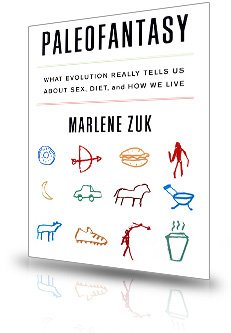
Paleofantasy: What Evolution Really Tells Us About Sex, Diet, And How We Live
by Marlene ZukPublisher: W.W. Norton
Price: $27.95
Who it's for: Primitive eaters looking to test their assumptions, or loved-ones-of-paleo-eaters who need ammo for an anti-paleo intervention.
In her new book "Paleofantasy," author Marlene Zuk often sounds like a college professor giving a verbal smack-down to a student who has arrived at an OK answer, but by the completely wrong method. Zuk, an evolutionary biologist, doesn't advocate sugar, fries, and sedentary living; on the contrary, readers could digest "Paleofantasy" in its entirety and feel as confident as ever in the healthiness of their meat-and-veggies menu. But they may think twice before ever using the p-word to describe it again.
More than nutritional specs, Zuk takes effective aim at the story behind the paleo diet, or what she calls "the evolutionary significance of everything." To the idea that we are a race of genetic cavemen trapped in the modern world, she responds "trap shmap," and "caveman shmaveman." Weaving research from the fields of genetics and evolutionary biology, she argues convincingly that "there was no single paleo lifestyle, any more than there is a single modern lifestyle," and that trying to live like "our ancestors" is a deluded undertaking based on misunderstandings of both history and biology.
Zuk dukes it out with the likes of Cordain and Sisson on a few points, but not as much as you might expect—or hope, for that matter. Instead, she makes heavy use of anonymous online commenters as her strawmen. Her obsession with picking off these low-level paleo footsoldiers sometimes makes Zuk's argument feel a bit more personal, and less focused, than it should be. On the other hand, given how dramatically these paleo advocates outnumber the Sissons of the world, maybe Zuk is intentionally trying to engage the people who are actually "making us unnecessarily wary of new foods and in the long run, new ideas." She does this effectively, but at a cost to her otherwise authoritative voice.
Is paleo now dead with the publishing of "Paleofantasy?" Definitely not. But if you're tired of rolling your eyes at your friend's half-baked version of paleo, consider dropping it anonymously in front of their cave. They might just end up a more science-based and skeptical eater, which is probably a good thing.
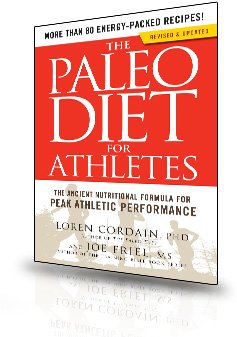
The Paleo Diet for Athletes: The Ancient Nutritional Formula for Peak Athletic Performance
by Loren Cordain and Joe FrielPublisher: Rodale
Price: $16.99
Who it's for: Endurance or sport-based athletes looking to tweak their diet to take performance to the next level.
Exciting title, right? But be warned before buying "The Paleo Diet for Athletes" and looking in the index under W for "weights" or S for "strength training." "The Paleo Diet for Athletes" should probably be renamed "The Paleo Diet for Endurance Athletes". This is clearer at some points than others, such as when Cordain and Friel make repeated reference to "the race" as the ultimate goal of their hypothetical athlete.
Although its basic tenets could work for most athletes, the primary purpose of the work is to discuss strategic carbohydrate use within a paleo framework. Given that endurance athletes generally require more carbohydrates than, say, a bodybuilder or a powerlifter, this will definitely be of more use to cyclists, runners, triathletes, soccer players, or other endurance competitors.
For people looking for an introduction to the dietary system and its arguments against modernity, "The Paleo Diet for Athletes" also provides a decent overview of paleo in general. Friel and Cordain detail why eating like a caveman is, in their opinion, the best way to eat and how our modern diet does nothing to improve athletic capabilities. They don't make hard-and-fast rules here as much as in Cordain's other works, though. Their guidelines are fully outlined, but readers are given leeway to adjust their level of paleo to match their performance needs.
This book likely won't be hugely helpful to someone whose goals are solely in the realm of weight training or bodybuilding, but it's a great fit for any endurance athlete interested in the paleo lifestyle. After reading this book, they'll be well-prepared to navigate the modern world of restaurants and supermarkets and still keep it clean.
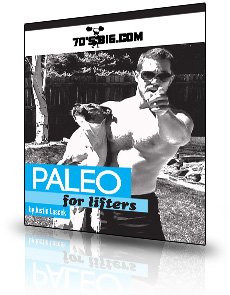
Paleo For Lifters
by Justin LascekPublisher: e-book: 70sbig.com
Price: $29.99
Who it's for: Strength athletes looking for a modified paleo model that anticipates their specific needs and goals.
Finally—a hardcore paleo guide for someone other than an endurance athlete … right? Not necessarily. After reading it, it's hard calling this ebook from the founder of the popular blog 70sBig.com "Paleo for Lifters;" perhaps "Justin's Personal Nutrition Philosophy" might be a more appropriate choice.
Lascek drops the names of paleo/primitive stalwarts Cordain, Wolf, and Sisson in the preface, including links to their work (which is one benefit of an ebook), but he largely leaves the science discussion to them. Instead, he writes from personal experience, addresses common life scenarios, and, in his words "combines performance eating with food quality to make the body function as optimally as possible."
Take it for what it is—a conversation, more or less—and it's easy to find value in Lascek's work. He provides a solid nutrition plan focusing on getting the most out of your time in the gym, with an extensive discussion of how macronutrients affect performance. He builds his plan along the paleo principles of staying relatively low-carb, sugar-free, high-fat, and high-protein, but doesn't club the reader over the head with the same old prehistoric imagery. Refreshingly, his plan is also built for life—in other words, he doesn't advocating strict restraint or dieting as the right way to approach eating habits.
Lascek's book isn't long, difficult, or boring. It's a quick and fun read because he is biting and witty, but also clearly knowledgeable. If you're not interested in dieting, but are looking for information about how slightly-more-principled eating can complement your goals as a strength athlete, "Paleo for Lifters" will be a valuable resource.
Recommended For You
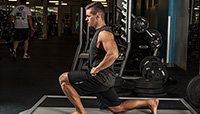
Be Footstrong: Your Guide To Strength Training And Minimalist Footwear
Unlace your beefy kicks and slip into something simpler, or slip out of shoes altogether for some of your training. Your reward could be greater strength, agility, and athletic performance.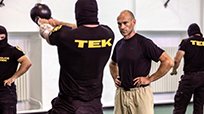
Pavel Tsatsouline: Return Of The Kettlebell Master
The kettlebell isn't just for fat-burning. It's a strength-builder that some of the world's mightiest lifters swear by. Hear the case for it from the man who brought it over from Russia!